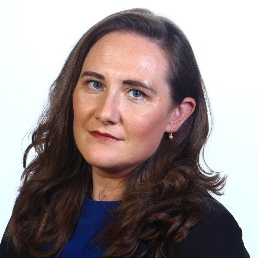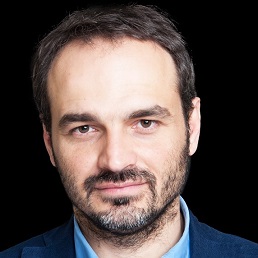HumanTech Meetings: Technologia to nie wszystko. Zarządzanie danymi cyfrowymi

Kwestia zarządzania danymi jest jednym z najbardziej palących problemów rozwoju cyfrowego. Istnieje wiele nowych możliwości wspierających postęp gospodarczy i społeczny w różnych obszarach – od zarządzania Zielonym Ładem, przez e-zdrowie, medycynę spersonalizowaną i użyteczność sztucznej inteligencji, po modele wymiany danych dla rozwoju np. samochodów samojezdnych. Te problemy są dziś mocno widoczne. Podczas kolejnego spotkania z serii HumanTech Meeting poruszymy kilka kluczowych aspektów rozwoju danych i zarządzania nimi, które przedstawią zaproszeni prelegenci – prof. Andrea Renda z CEPS, wiodącego think tanku i forum debaty o sprawach UE, oraz dr Anna Kalinowska, kulturoznawca i badaczka społeczno-kulturowa z Uniwersytetu SWPS.
Spotkanie poprowadzi dr Michał Boni, były minister administracji i cyfryzacji RP, wykładowca na Uniwersytecie SWPS.
„HumanTech Meetings” – zadanie finansowane w ramach umowy 792/P-DUN/2019 ze środków Ministra Nauki i Szkolnictwa Wyższego przeznaczonych na działalność upowszechniającą naukę.
Prelekcje odbędą się w języku polskim oraz angielskim i będą tłumaczone.
Formuła spotkania
Żyjemy w czasach postępu technologicznego i dynamicznego rozwoju cyfryzacji. Współczesny pęd do tworzenia nowoczesnych rozwiązań może powodować trudne do przewidzenia skutki psychologiczne i społeczne. Dlatego tak ważne jest nawiązywanie współpracy między inżynierami, programistami, specjalistami IT oraz przedstawicielami nauk społecznych już na wstępnym etapie opracowywania nowej technologii lub usługi. To nie tylko daje szansę na uniknięcie błędów, lecz także umożliwia rozwinięcie innowacyjnego pomysłu.
Projekt HumanTech Meetings to seria spotkań skupiających naukowców i specjalistów z branży technologicznej z Polski i innych krajów. Każde spotkanie składa się z dwóch wykładów, jednego wygłoszonego przez eksperta z Polski i jednego wygłoszonego przez specjalistę z innego kraju. Po wykładach organizujemy dyskusje panelowe, podczas których zaproszeni goście przedstawiają różne podejścia do innowacji i technologii. Spotkania organizowane są przez Centrum Innowacji Społecznych i Technologicznych HumanTech Uniwersytetu SWPS.
Wiemy już, jak bardzo dla rozwoju świata (nie tylko cyfrowego) potrzebne są dane – dostęp do nich, zasady ich wykorzystywania zgodne z prawami fundamentalnymi (ochrona prywatności i bezpieczeństwo) czy warunki bezpiecznego przechowywania, a także jasne reguły przekazywania oraz przepływu. Kluczem jest przetwarzanie danych – w wielu celach: prognozowania zdarzeń, zarządzania procesami produkcji i logistyką, wsparcia personalizacji usług medycznych (lepsza diagnoza i terapia). Na specjalną uwagę zasługuje też to, w jaki sposób dane powinny być dostępne i jak poszerzać możliwości Otwartych Danych. Zarazem – trzeba dostrzegać zagrożenia związane z przetwarzaniem danych, od presji konsumpcyjnych po polaryzację społeczną budowaną przez wykorzystywanie ich dla manipulacji informacyjnej i siania nienawiści. Unia Europejska ma szansę tworzyć dobre normy i reguły zarządzania danymi, tak, by stawały się standardami globalnymi. O tych problemach, wyzwaniach i szansach będziemy mówić podczas spotkania HumanTech, a wprowadzi nas w dyskusję swoim wykładem znakomity profesor Andrea Renda.
dr Michał Boni, były minister administracji i cyfryzacji RP, prowadzący spotkanie
Wystąpienia
Lecture 1: DATA MANAGEMENT CHALLENGES IN THE LIGHT OF THE LEGISLATIVE PROPOSALS AND THE NEEDS FOR THE DIGITAL DEVELOPMENT – prof. Andrea Renda (CEPS, BRUSSELS)
This is fundamental: How the existing and proposed models of the data-sharing look like in the light of the Single Market 2.0 on the one side, and on the other - in the perspective presented by the European Commission proposals?
It is crucial: How we can solve the problem of the data “ownership” principles and meet them with openness for common data sharing ? What kinds of conditions are needed: schemes for data sharing services, the rules for re-using of data, access to the open data sources, obligations for fairness and compliance with GDPR and competition rules?
This is significant: How to build the data sharing platforms and promote B2B (managed) data sharing, developing at the same time the most adequate and effective relations between persons (individuals), businesses, and public, governmental institutions?
It is important: How to establish the new DATA ECOSYSTEM (in the European Union) focused on cooperation between: sectoral data spaces, open Internet, digital platforms, and digital government, with legal and semantic interoperability, based on high quality of infrastructure and federated cloud, also open for the Internet of Things, and first of all - oriented on the end-users.

prof. Andrea Renda – is a Senior Research Fellow and Head of Global Governance, Regulation, Innovation and the Digital Economy (GRID) at CEPS. He is currently a non-resident Senior Fellow at Duke University’s Kenan Institute for Ethics, and was Adjunct Professor of Law and Economics at Duke Law School (United States) for Academic Year 2016/2017. In September 2017, he was appointed the “Google Chair” for Digital Innovation at the College of Europe in Bruges (Belgium), where he has been teaching a course on “Regulatory Impact Assessment for Business” since 2007. His current research interests include regulation and policy evaluation, regulatory governance, private regulation, innovation and competition policies, Internet policy, and the alignment of policies for long-term impacts such as sustainability and decarbonization. He also specializes in EU law and policymaking, and in international regulatory cooperation. He is the author of many papers and books, including: Artificial Intelligence. Ethics, Governance and Policy Challenges(2019), Brussels.
Panel dyskusyjny
DATA GOVERNANCE – THINK ABOUT CONDITIONS, DO NOT FORGET ABOUT BENEFITS

Eline Chivot – is a senior adviser on digital policy at the European People’s Party (EPP), the centre-right, pro-European political party which gathers over 70 national parties from 40 countries. Her role includes consolidating and fostering the party’s knowledge and positions regarding the public policies that impact the technology sector, its actors, and the data economy. Throughout this experience and her previous positions, Eline covers European technology policies as diverse as those relating to content liability and moderation, disinformation, data protection and privacy, emerging technologies like AI, competition policy and antitrust. Prior to joining the EPP, Eline was a senior policy analyst at the Center for Data Innovation, a D.C. and Brussels-based research institute affiliated with the Innovation and Technology Information Foundation (ITIF). Eline also worked at DIGITALEUROPE, one of Brussels’ largest trade associations where she managed relations with representatives of the tech industry, and as policy analyst at the Hague Center for Strategic Studies (HCSS) in the Netherlands, developing research projects on defence, security, and economic policy issues.

Iverna Mc Gowen – is Director of CDT’s Europe Office, and an advocate for ensuring international human rights standards are at the core of law and policy related to technology. At CDT, Iverna leads the Brussels-based Europe team that works to put human rights and democracy at the center of the European Union and its member countries’ tech policy agendas. She holds a B.A. in European Studies from Trinity College Dublin and an LL.M from Maastricht University’s School of European Law, where she was awarded a scholarship for having graduated as a top three percent scholar. She is a frequent commentator on human rights, EU foreign policy, and gender equality, and has contributed to pieces by Euronews, CNN, BBC, RTE, and Reuters.

Alek Tarkowski – is a sociologist, digital rights activist and digital public policy maker. He is Director of strategy at the Open Future Foundation. In 2010, he cofounded the Digital Centre Foundation and was its President until 2020. He is a Member of the Board of Directors of the American Creative Commons Foundation and co-founder of Communia, the European association for the digital public domain and the Creative Commons Poland initiative. A graduate of the Leadership Academy for Poland (Class of 2017), Alek was named a New Europe 100 Challenger in 2016. In the past, he was a member of the Prime Minister's Team of Strategic Advisors (2008-2011), a member of the Information Technology Council and the Digitalization Council (2011-2016), and a Junior Fellow in the McLuhan Program on Culture and Technology at the University of Toronto. Alek is a member of the Steering Committee of the Internet Governance Forum Poland. He also sits on the Program Committee of the School of Ideas, an innovative study program offered by SWPS University, and on Advisory Board of the Commonwealth of Learning Center for Connected Learning. He regularly works on strategies and public policies that enable digital technologies conducive to openness, collaboration, and engagement.
Lecture 2: SOCIAL PROGRAMMING OF EVERYDAY LIFE: BETWEEN DIGITAL IDENTITY AND SELF-TECHNOLOGIES – Anna Kalinowska

Anna Kalinowska – is a cultural studies scholar and socio-cultural researcher. She is a member of the Polish Society of Market and Opinion Researchers, the Polish Society for Media Education and an active member of the Youth Research Center at the SWPS University. She has 10 years of research experience in the areas of cultural policies and digital culture, also in designing original research. In her projects, Anna focuses on issues related to sociology of networks and digital identity of users. She also works on adapting the concept of technologies of the self in the digital age. She is President of the BITECH Foundation for Science Support and Education Development, and owner of a creative hub #teamkalina. Moreover, Anna teaches at the Polish-Japanese Academy of Information Technology and collaborates with the Kozminski University as a digital ethnographer. She often speaks at conferences, such as the Media Education Congress, Tech/Spo, and the Internet Governance Forum 2020. Her articles appeard Popular Culture and State and Society.
Spotkanie poprowadzi

dr Michał Boni – holds a doctoral degree in humanities. From 1977 to 1989, he was assistant professor at the University of Warsaw. He was an activist of the underground "S" organization and Head of the Mazovia region of "Solidarity" (1989-1990). He held several governmental and other prominent positions, including: Minister in the Labor and Social Policy (1991), Secretary of State in the Ministry of Labor and Social Policy (1992 - 1993), and Member of the Sejm (1991-1993). He was also the founder and head of the Institute of Public Affairs (1996-1997), advisor in the government of Jerzy Buzek, advisor to "Lewiatan", a Polish business organization, for EU projects (2002-2007), Head of Strategic Advisers to the Prime Minister Donald Tusk and the Permanent Committee of the Council of Ministers (minister: 2008 - 2011). He was the first minister of digitization in Central and Eastern Europe (2011-2013) and author of the DIGITAL POLAND program. He was a Member of the European Parliament (2014-2019), actively working in the Freedom and Justice Committee and the Industry and Science Committee (digital affairs). His area of expertise includes: legislation on data protection and privacy, access and information data as open data, the development of gigabit-society and 5G, the functioning of Artificial Intelligence, the establishment of the European Open Data Cloud for Science and Supercomputers in the EU. He is the initiator of the establishment program and fund: Rights and Values addressed to civic organizations. He is also the author and coordinator of work on the POLSKA 2030 report and YOUTH 2011 and YOUTH 2018 reports. He has also written many articles and larger publications, including "Artificial Intelligence and Management Beyond Ethics" (Martens Center). Currently, he is Assistant Professor at SWPS University and Senior Researcher Associate at Martens Center (a think tank in Brussels).
Spotkanie otworzy

dr Konrad Maj – psycholog społeczny, kierownik projektu HumanTech Meetings, inicjator oraz kierownik Centrum Innowacji Społecznych i Technologicznych „HumanTech”. W pracy naukowej i dydaktycznej koncentruje się na zagadnieniach związanych z wpływem społecznym, psychologią mediów oraz innowacjami. Obecnie prowadzi badania w obszarze HRI (Human-Robot-Interaction). W latach 2013–2016 pełnomocnik prorektora ds. nauki w zakresie komercjalizacji wyników badań naukowych i innowacji społecznych. Odbył szereg wizyt studyjnych w ośrodkach zajmujących się innowacjami ISI – Institute for Social Innovation (Carnegie Mellon University, Pittsburgh, USA), ID+ Research Institute for Design, Media and Culture (University of Averio, Portugalia), Design Factory (Aalto University, Finlandia).
Organizator
Centrum Innowacji Społecznych i Technologicznych HumanTech >>
Główny partner

Partnerzy

Patroni medialni

Sponsor

Termin i miejsce
12 kwietnia 2021 r. (poniedziałek), godz. 17.00–19.30
online
Kontakt
e-mail: Ten adres pocztowy jest chroniony przed spamowaniem. Aby go zobaczyć, konieczne jest włączenie w przeglądarce obsługi JavaScript.Koordynator: Ewa Łuczak
e-mail: Ten adres pocztowy jest chroniony przed spamowaniem. Aby go zobaczyć, konieczne jest włączenie w przeglądarce obsługi JavaScript.
Projekt (no. 422493) dofinansowany przez Ministerstwo Nauki i Szkolnictwa Wyższego, w ramach „Funduszu Upowszechniania Nauki”.



